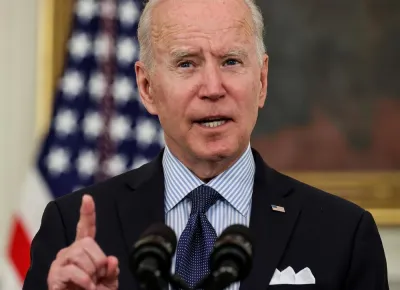The Biden administration announced late last week that they would reduce the spending proposed in the American Jobs Plan from $2.25 trillion to $1.7 trillion, although there is some question about the true significance of those changes.

"The Biden White House said on Friday that it was reducing the proposed price tag for its infrastructure plan from $2.25 trillion in 'additional investment' to $1.7 trillion in an attempt to win Republican support," report Ben Leonard, Christopher, and Natasha Korecki.
The Biden administration is presenting the countereffort as an effort to forge a bipartisan deal for the package of spending programs and reforms included in the American Jobs Plan, as proposed in March 2021.
The article includes some detail about the ground the Biden administration ceded with this negotiation ploy.
The fine print makes clear, however, that the concessions the administration was willing to make were not that dramatic as the top line numbers suggest. That’s because they proposed “shifting” spending on research and development, small business, supply chains and manufacturing into other proposals, including the Endless Frontier Act and the CHIPS Act, Psaki said.
According to the article, the changes are unlikely to satisfy Republicans, as details of the proposed cuts further elucidate:
The new Biden infrastructure proposal also would cut broadband spending to match the Republicans' latest offer, and cut investment in "roads, bridges and major projects" to get closer to the Republicans’ bottom line — a point one administration official involved in the talks called ironic given the GOP’s insistence that the package focus heavily on improving “core” infrastructure — but a concession nonetheless.
Earlier in the week, Republicans on the U.S. House of Representatives Transportation and Infrastructure Committee proposed a $400 billion package that would reauthorize the five-year federal surface transportation bill, according to an article by David Shepardson, in addition to serving as a counteroffer to the American Jobs Plan.
Additional new reporting on the Biden counteroffer is available from Jarret Renshaw and Jeff Mason for Reuters.
FULL STORY: White House cuts infrastructure proposal to $1.7 trillion in counter to GOP

Analysis: Cybertruck Fatality Rate Far Exceeds That of Ford Pinto
The Tesla Cybertruck was recalled seven times last year.

National Parks Layoffs Will Cause Communities to Lose Billions
Thousands of essential park workers were laid off this week, just before the busy spring break season.

Retro-silient?: America’s First “Eco-burb,” The Woodlands Turns 50
A master-planned community north of Houston offers lessons on green infrastructure and resilient design, but falls short of its founder’s lofty affordability and walkability goals.

Test News Post 1
This is a summary

Analysis: Cybertruck Fatality Rate Far Exceeds That of Ford Pinto
The Tesla Cybertruck was recalled seven times last year.

Test News Headline 46
Test for the image on the front page.
Urban Design for Planners 1: Software Tools
This six-course series explores essential urban design concepts using open source software and equips planners with the tools they need to participate fully in the urban design process.
Planning for Universal Design
Learn the tools for implementing Universal Design in planning regulations.
EMC Planning Group, Inc.
Planetizen
Planetizen
Mpact (formerly Rail~Volution)
Great Falls Development Authority, Inc.
HUDs Office of Policy Development and Research
NYU Wagner Graduate School of Public Service




























